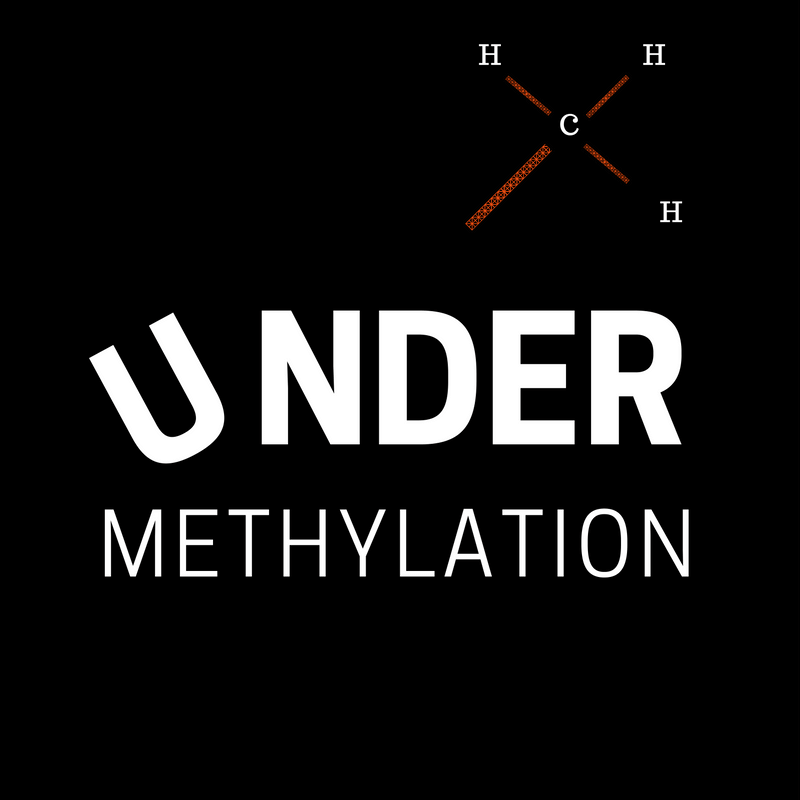Assuming you are suffering from undermethylation, there are numerous supplements you can consider for treatment. Generally treatment doesn’t yield drastic improvement overnight, and in some cases it can take 8 to 12 months before a person feels noticeably better. However, it is also important to realize that nutritional intervention can be highly effective and successful over the long-term.
Since undermethylation results in low levels of calcium, magnesium, methionine, and Vitamin B6 – it’s important to consider these for supplementation. Additionally it may be important to avoid folic acid as levels may be abnormally high throughout neurons. Correcting nutritional imbalances is considered an important step towards improving undermethylation symptoms.
Supplements for Undermethylation
Most people aren’t fans of taking pharmaceutical medications once they have pinpointed the problem of undermethylation. If you know for a fact that undermethylation is the problem, taking a targeted nutritional approach is your best bet. Work with a professional to determine what quantities of vitamins and/or “stack” you should be taking.
Choline
Calcium
Magnesium
Methionine
Omega-3 fatty acids
SAM-e
Vitamin B12
Vitamin C
Taking herbs to improve the body’s methylation will not work, as these substances have no natural role to play in human biochemistry. Methylation is carried out by specific enzymes, each one using specific nutrients – it cannot be done in any other way.
START WITH THE BASICS FIRST BEFORE YOU ADD SUPPLEMENTS
Our modern way of life affects methylation.
There is a huge array of cellular damage from our toxic environment which damages cellular function. Mobile phones, planes, radiation, water pollutants, industrial wastes, pesticides, cosmetics. These build up to a point where our body’s self-regulatory processes break down and chronic disease results.
Genetically modified foods damage DNA.
Environmental pollutants like Bisphenol A in plastics.
Stress – stress uses up many methyl groups so if there are not enough and we have a mutation that stops us creating them we are in trouble. If the stress response is using up the methyl groups then this shortage will affect other systems like the brain, thyroid function, fatigue etc. Sometimes the stress response turns off but it doesn’t have enough methylation to turn it off.
Ageing – methyl groups decline with age. So cognitive decline can be greater if we have a decrease of methyl groups.
Breathing & Thoughts
Water
Public Water is a man-made chemical liquid. Most municipal water is not detoxi4ied and chemical substances are added to the water (chlorine, 4luoride, etc.)
Sleep
Food
Avoid processed, toxic foods which increases the stress on your body and requirement to detoxify.
Food is highly contaminated with chemical like styrene and dioxin, antibiotics, hormones, preservatives, additives, fertilizers, herbicides, pesticides. 100% of human fat biopsies contained residues of un-detoxi4ied styrene, dioxin, xylene, 1,4- dichlorobenzene!
Histamine rich foods: Foods that are associated with high histamine levels include fermented foods such as sauerkraut, kombucha, pickles, wine, yogurt, mature cheeses and fermented soy products. It also includes cured, smoked and fermented meats such as salami and sausage, etc. Tomato paste, spinach and canned fish products also have high histamine levels. Citrus foods are histamine liberators which increase histamine release and so should also be avoided.
Symptoms of Toxicity
Fatigue Depression
Weight problems Lethargy
Muscle Pain
Joint pain
Memory Loss Headaches
GI issues
Poor concentration Anxiety
Arthritis
Infertility
Cancer
Auto-immune diseases Nutrient deficiencies and more!
Eat a diet rich in whole foods that are 4illed with vitamins and minerals. Eat only high quality fats and proteins.
Eat your meat and greens –
Proteins high in cysteine, glycine and glutamate will help to top up your glutathione levels. Choose a variety of different grass-fed muscle and organ meats, wild fish and organic, free-range eggs.
Dark green leafy vegetables contain folate, which is a methyl donor.
Eating sulfur-containing foods is key to make more glutathione, so include garlic, onions, broccoli, cauliflower, kale, cabbage, watercress and bok choy.
Movement – link to membership site
Exercise improves your mood, supports better sleep, gets your circulation of blood and lymph going for improved cellular function and detoxification.
Clean up your home and work environment.
Xenobiotics: styrene (Styrofoam, plastics, etc.), dioxin (bleached products from diapers, milk cartons, etc.), xylene (exhaust, etc.), pesticides, benzene (gasoline and backing of carpets), PCBS (paints, pesticides, gasoline, etc.), xenoestrogens (pesticides, herbicides, fungicides, plastic wrap, etc.), phthalates (plastics), cyanide (almonds), heavy metals (mercury, lead, cadmium, aluminum, etc.). One group of xenobiotics is made up of environmental estrogens, referred to as xenoestrogens, which mimic animal hormones and act as endocrine system disrupters.
SUPPLEMENTS
Use support supplements ONLY when a strong nutritional foundation has been established and ONLY when needed. Supplements can assist in providing speci4ic cofactors required in enzymatic reactions and can protect against the stress hormones. However, if supplements are taken without proper nutrition they can be turned into toxic metabolites and perpetuate the vicious cycle.
If you have a MTHFR gene mutation, supplements will be warranted. Treatment does vary from patient to patient and usually involves a combination of nutrients. These include methylcobalamin (methyl-B12), methylfolate (5-MTHF) and pyridoxyl-5-phosphate (P5P).
There are other supplements that may be used to aid the methylation pathway such as Methionione and Trimethylglycine however some of these compounds especially SAMe may actually make things worse in some people. Glutathione should also be supplemented to help increase low levels.
Repairing the gut and optimising your good/bad bacteria should be paramount, since toxins excreted by bad bacteria inhibit methylation.
Methylfolate
Methylcobalamin
Betaine in the form of Trimethyl glycine
N-Acetyl Cysteine
Glutathione
Pyridoxal-5-phosphate
Riboflavin
Curcumin
Mixed tocopherals (vitamin E)
Silymarin (Milk Thistle)
EPA/DHA – Fish Oils
Phosphatidylcholine
Vitamin C
Vitamin D3
Comprehensive multivitamin/multimineral
Probiotics
Zinc
Magnesium
Vitamins C, D and E – to produce glutathione
Selenium – to produce glutathione


